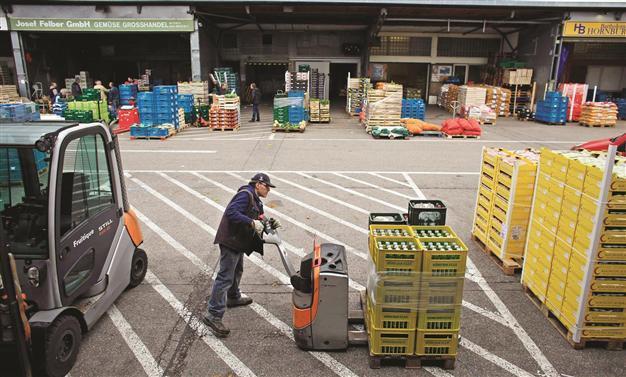German unemployment up to highest level this month
BERLIN - Reuters

REUTERS photo
German unemployment rose to its highest level in two-and-a-half years in November, new data showed, a day after Chancellor Angela Merkel unveiled coalition plans that row back on decade-old reforms credited with rejuvenating the labor market.The number of people out of work increased for a fourth consecutive month, climbing by 10,000 to 2.9 million on a seasonally adjusted basis, data from the Labour Office showed. The adjusted jobless rate was unchanged at 6.9 percent.
Major German companies have said they will slash jobs, with construction and machinery group Bauer planning to cut its workforce by as much as 3 percent and utility RWE also laying out plans for thousands of job cuts.
Workers at aerospace group EADS staged walkouts across Germany yesterday over plans to slash defense jobs at the parent of planemaker Airbus.
But Germany’s leading economic institutes have warned that plans to introduce a minimum wage of 8.50 euros per hour, as laid out in a coalition deal agreed by Merkel and the Social Democrats (SPD) on Nov. 27 could lead to job losses.
“Today’s numbers send a clear warning that the labour market has reached its natural rate of unemployment,” said Carsten Brzeski, senior economist at ING.
“To continue the current job market miracle or start a new one, a minimum wage should be flanked by additional measures to create new jobs.”
Number of employed people surges
On the other hand, data from the Statistics Office earlier yesterday showed the number of people in work climbing to a record high of more than 42 million.
That bodes well for domestic demand, on which Berlin is relying to prop up growth this year as the traditionally export-driven economy suffers from weakening demand from the euro zone and a slowdown in emerging markets.
Moderate inflation, robust wage hikes and low interest rates are also encouraging Germans, traditionally a nation of savers, to splash out more cash.
Morale among consumers climbed to a 6-year high heading into December. And data last week showed domestic demand drove growth of 0.3 percent between July and September, helping the euro zone stave off stagnation, while foreign trade dragged.
Other data has shown business morale surging to its highest level in 1-1/2 years, suggesting firms may hire more staff in the future, and the private sector is growing faster, with service providers recruiting more staff as their order books were fuller, though factories slashed jobs.
Still, some economists have panned the 185-page policy blueprint unveiled on Wednesday by Merkel and the SPD. The coalition program would increase pensions and tighten rules on temporary work introduced under the “Agenda 2010” reforms of SPD Chancellor Gerhard Schroeder.
The parties also agreed to a far smaller boost in public infrastructure spending than many observers had expected.
















